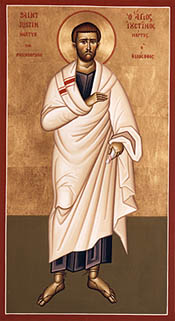3 Lent

Justin Martyr's First Apology is addressed to the Emperor and his household. Justin offers a lengthy and careful defense of the Christian faith in response to laws that made Christian practice a punishable offense.
He says of the martyrs, "…they conquer you by lavishing their own lives rather than obey in what you require them to do" (1 Apol. 70).
Regarding the ethical lives of the Christians, he says
"…We, who formerly gave loose to fornication, now strive only after purity; we, who took delight in arts of magic, now dedicate ourselves to the good and unbegotten God; we, who loved the path to riches and possessions above any other, now produce what we have in common, and give to every one who needs; we, who hated and destroyed one another, and would not make use even of the same fire with those of another tribe, because of their different customs; now, since the coming of Christ, live together, and pray for our enemies, and endeavor to persuade those who hate us unjustly, that all who have lived in accordance with the good precepts of Christ, may come to a good hope of obtaining from God, the Ruler of all things, the same reward as ourselves" (14).Early Christian writers often appealed to the post-exorcism, post-baptismal ethics of Christian converts as evidence of both the religion's goodness and the power of their god.
Justin quotes a great deal of Scripture and New Testament writings regarding Christian ethics and the wisdom of the prophets. He argues that the greatest Greek philosophers were essentially Christians, because in their best writings they were inspired by the Logos, or had copied from the Jewish prophets outright.
Riiiiiight.
Quoting almost the entire Sermon on the Mount, he argues that Christians are quietists, and since their kingdom is a heavenly one, they are no threat to the peace and safety of the Empire.
Somehow, I think the author of Revelation would disagree. I know I do.
He rambles a bit, and talks about what occurs in the Eucharistic assemblies. He emphasizes the care of widows and orphans. There are funny bits; he tries to shame his Roman readers by reminding them that the gods they celebrate in their civic religion tend to be pretty immoral in the stories that are told about them. After all, people declare themselves to be gods all the time, and say all kinds of things that corrupt youths (24-26). Yet who gets killed for it? Fine upstanding people like Socrates. And oh yeah, the Christians.
I didn't really fall in love with this one, as you might have guessed by now.
Next up: Cyprian of Carthage...
Technorati Tags: theology, christianity





4 comments:
Why would the author of Revelation disagree?
-John
Yah, I was a little confused by that one. I have always like this dooder, and there you go shattering my hopes and dreams!
YOU RUN LIKE A WELSHMAN!
Kyle,
I forget exactly when Justin was writing - wasn't it sort of mid to late 2nd Centuary? - but it's interesting to see the contrast between his 'don't Rock the Roman boat' and Paul's 'there's only one Lord and it ain't Caesar...'.
Does this raise a question about how the 'church' lost the sense of political reality about the Kingdom of God, or was it still there but Justin is sort of trying to 'smooth things over' during a particularly tough time?
On that point I could also equally see Paul (who is never one to be 'stuck in a particular box') make the point that it's stupid to punish those who are actually trying to address the suffering within Empire (and it could also be noted that, within Romans at least, he's more than happy to see Empire as 'a way' of God protecting Humanity from it's own Sin - even if such a system needs thorough overhaul by the Gospel of Jesus!).
Richard
John's Apocalypse is a long book at the end of the New Testament that details, in very colorful language, just what kind of threat this "heavenly kingdom" presents to all earthly powers. It's presence on the earth now is shaking up the Empire (whether Caesar realizes that or not) and will before long completely uproot its foundations.
There is nothing remotely benign about this heavenly kingdom that has begun colonizing "earth."
Richard, I think that's precisely the question that this raises - in the time between the Apostles and Justin (indeed towards the end of the 2nd century) we have a bit of confusing growing about just what the heavenly kingdom is and means, especially regarding your point about Paul.
Post a Comment